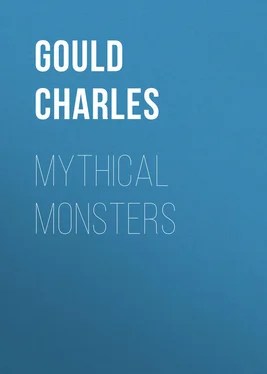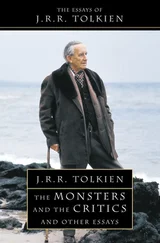Charles Gould - Mythical Monsters
Здесь есть возможность читать онлайн «Charles Gould - Mythical Monsters» — ознакомительный отрывок электронной книги совершенно бесплатно, а после прочтения отрывка купить полную версию. В некоторых случаях можно слушать аудио, скачать через торрент в формате fb2 и присутствует краткое содержание. Жанр: Мифы. Легенды. Эпос, Природа и животные, foreign_antique, foreign_prose, на английском языке. Описание произведения, (предисловие) а так же отзывы посетителей доступны на портале библиотеки ЛибКат.
- Название:Mythical Monsters
- Автор:
- Жанр:
- Год:неизвестен
- ISBN:нет данных
- Рейтинг книги:5 / 5. Голосов: 1
-
Избранное:Добавить в избранное
- Отзывы:
-
Ваша оценка:
- 100
- 1
- 2
- 3
- 4
- 5
Mythical Monsters: краткое содержание, описание и аннотация
Предлагаем к чтению аннотацию, описание, краткое содержание или предисловие (зависит от того, что написал сам автор книги «Mythical Monsters»). Если вы не нашли необходимую информацию о книге — напишите в комментариях, мы постараемся отыскать её.
Mythical Monsters — читать онлайн ознакомительный отрывок
Ниже представлен текст книги, разбитый по страницам. Система сохранения места последней прочитанной страницы, позволяет с удобством читать онлайн бесплатно книгу «Mythical Monsters», без необходимости каждый раз заново искать на чём Вы остановились. Поставьте закладку, и сможете в любой момент перейти на страницу, на которой закончили чтение.
Интервал:
Закладка:
The author of Atlantis , 6 6 Atlantis; the Antediluvian World. J. Donelly, New York, 1882. The author has amassed, with untiring labour, a large amount of evidence to prove that the island of Atlantis, in place of being a myth or fable of Plato, really once existed; was the source of all modern arts and civilization; and was destroyed in a catastrophe which he identifies with the Biblical Deluge.
indeed, claims that the gods and goddesses of the ancient Greeks, the Phœnicians, the Hindoos, and the Scandinavians were simply the kings, queens, and heroes of Atlantis, and the acts attributed to them in mythology a confused recollection of real historical events. Without conceding the locus of the originals, which requires much greater examination than I am able to make at the present time, I quite agree with him as to the principle. I believe that the mythological deities represent a confused chronology of far-distant times, and that the destruction of the Nemean lion, the Lernean hydra, and the Minotaur are simply the records of acts of unusual bravery in combating ferocious animals.
On the first landing of Pizarro the Mexicans entertained the opinion that man and horse were parts of one strange animal, 7 7 So also, Father Stanislaus Arlet, of the Society of Jesus, writing to the General of the Society in 1698 respecting a new Mission in Peru, and speaking of a Peruvian tribe calling themselves Canisian, says: “Having never before seen horses, or men resembling us in colour and dress, the astonishment they showed at our first appearance among them was a very pleasing spectacle to us, the sight of us terrifying them to such a degree that the bows and arrows fell from their hand; imagining, as they afterwards owned, that the man, his hat, his clothes, and the horse he rode upon, composed but one animal.”
and we have thus a clue to the explanation of the origin of the belief in centaurs from a distant view of horsemen, a view possibly followed by the immediate flight of the observer, which rendered a solution of the extraordinary phenomenon impossible.
Ferdinand Mendez Pinto quaintly observes, in one of his earlier chapters, “I will not speak of the Palace Royal, because I saw it but on the outside, howbeit the Chinese tell such wonders of it as would amaze a man; for it is my intent to relate nothing save what we beheld here with our own eyes, and that was so much as that I am afraid to write it; not that it would seem strange to those who have seen and read the marvels of the kingdom of China, but because I doubt that they which would compare those wondrous things that are in the countries they have not seen, with that little they have seen in their own, will make some question of it, or, it may be, give no credit at all to these truths, because they are not conformable to their understanding and small experience.” 8
Now as some of the creatures whose existence I shall have to contend for in these volumes are objects of derision to a large proportion of mankind, and of reasonable doubt to another, I cannot help fortifying myself with some such outwork of reasoning as the pith of Pinto’s remarks affords, and supplementing it by adding that, while the balance between scepticism and credulity is undoubtedly always difficult to hold, yet, as Lord Bacon well remarks, “There is nothing makes a man suspect much more than to know little; and therefore men should remedy suspicion by procuring to know more.”
Whately extends Bacon’s proposition by adding, “This is equally true of the suspicions that have reference to things as persons”; in other words, ignorance and suspicion go hand-in-hand, and so travellers’ tales, even when supported by good evidence, are mostly denied credence or accepted with repugnance, when they offend the experience of those who, remaining at home, are thus only partially educated. Hence it is, not to go too far back for examples, that we have seen Bruce, Mungo Park, Du Chaillu, Gordon Cumming, Schliemann, 9and Stanley treated with the most ungenerous criticism and contemptuous disbelief by persons who, however well informed in many subjects, lacked the extended and appreciative views which can only be acquired by travel.
Nor is this incredulity limited to travellers’ tales about savage life. It is just as often displayed in reference to the surroundings of uneventful life, provided they are different from those with which we are familiar.
Saladin rebuked the Knight of the Leopard for falsehood when the latter assured him that the waters of lakes in his own country became at times solidified, so that armed and mounted knights could cross them as if on dry land. And the wise Indian who was taken down to see the large American cities, with the expectation that, being convinced of the resources and irresistible power of civilization he would influence his tribe to submission on his return, to the surprise of the commissioners who had conveyed him, spoke in directly contrary terms to those expected of him, privately explaining in reply to their remonstrances, that had he told the truth to his tribe he would have been indelibly branded for the remainder of his life as an outrageous and contemptible liar. Chinese students, despatched for education in American or European capitals, are compelled on their return to make similar reservations, under pain of incurring a like penalty; and officials who, from contact with Europeans at the open ports, get their ideas expanded too quickly, are said to be liable to isolation in distant regions, where their advanced and fantastic opinions may do as little harm to right-thinking people as possible. 10
Even scientific men are sometimes as crassly incredulous as the uncultured masses. On this point hear Mr. A. R. Wallace. 11“Many now living remember the time (for it is little more than twenty years ago) when the antiquity of man, as now understood, was universally discredited. Not only theologians, but even geologists taught us that man belonged to the existing state of things; that the extinct animals of the tertiary period had finally disappeared, and that the earth’s surface had assumed its present condition before the human race first came into existence. So prepossessed were scientific men with this idea, which yet rested on purely negative evidence, and could not be supported by any argument of scientific value, that numerous facts which had been presented at intervals for half a century, all tending to prove the existence of man at very remote epochs, were silently ignored, and, more than this, the detailed statements of three distinct and careful observers confirming each other were rejected by a great scientific society as too improbable for publication, only because they proved (if they were true) the co-existence of man with extinct animals.” 12
The travels of that faithful historian, Marco Polo, were for a long time considered as fables, and the graphic descriptions of the Abbé Huc even still find detractors continuing the rôle of those who maintained that he had never even visited the countries which he described.
Gordon Cumming was disbelieved when he asserted that he had killed an antelope, out of a herd, with a rifle-shot at a distance of eight hundred yards.
Madame Merian 13was accused of deliberate falsehood in reference to her description of a bird-eating spider nearly two hundred years ago. But now-a-days Mr. Bates and other reliable observers have confirmed it in regard to South America, India, and elsewhere.
Audubon was similarly accused by botanists of having invented the yellow water-lily, which he figured in his Birds of the South under the name of Nymphæa lutea, and after having lain under the imputation for years, was confirmed at last by the discovery of the long-lost flower, in Florida, by Mrs. Mary Trent, in the summer of 1876; 14and this encourages us to hope that some day or other a fortunate sportsman may rediscover the Haliætus Washingtonii, in regard to which Dr. Cover says: “That famous bird of Washington was a myth; either Audubon was mistaken, or else, as some do not hesitate to affirm, he lied about it.”
Читать дальшеИнтервал:
Закладка:
Похожие книги на «Mythical Monsters»
Представляем Вашему вниманию похожие книги на «Mythical Monsters» списком для выбора. Мы отобрали схожую по названию и смыслу литературу в надежде предоставить читателям больше вариантов отыскать новые, интересные, ещё непрочитанные произведения.
Обсуждение, отзывы о книге «Mythical Monsters» и просто собственные мнения читателей. Оставьте ваши комментарии, напишите, что Вы думаете о произведении, его смысле или главных героях. Укажите что конкретно понравилось, а что нет, и почему Вы так считаете.











